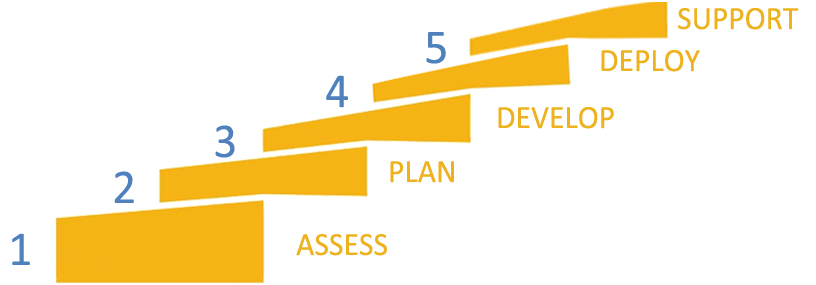5-Step Migration Methodology
With our proven migration methodology, our experts can guide you through each step of your migration projects.

Assess
Based on your business migration driver, we will assess your source and target environment. We will identify database and application suitability and availability, and platform independent challenges while moving from UNIX to Linux. As a result you will get an assessment report on the risks involved, effort estimate and cost.
Plan
We will develop a detailed plan on the migration process and the in-house applications to be ported from UNIX to Linux including staffing requirements. We will work closely with you to ensure the development plan meets your business objectives and help us develop a Proof of Concept (PoC). At the end you will receive a report on Project, Staffing Plan and Proof of Concept .
Develop
We will expand the PoC to real project. Your existing application stack is either virtualized or consolidated. Customized Linux installation on target environment and ISV components are finalized. After your review and approval, we will start building and packaging for deployment and develop training and support for your staff. At the end, you will get a detailed and a working Proof of Concept.
Deploy
We will do a pilot deployment after reviewing the data, training and support. Upon successful deployment and further review, the cut over to the new infrastructure is done.
Support
We will support you extensively as part of our project implementation. We will ensure environment stability, validate back-up and high availability tools, and tweak acceptance metrics against business benchmarks. We will also continue to train your key staff with end-user documentation.
To know more about our support, please contact us by email at [email protected] or call us at +1 (408) 850 2243.Migration
Migration Tools
Enterprise IT- Cloud Services
- Performance Tools
- Products/Solutions QA Certification
- Database Services
- Hadoop/Business Analytics
- Virtualization Services
- Open Source Services
- Enterprise Security
- Web Caching
- Solutions Demo Portals
- Internet of Things (IoT)
- OpenEMR Solutions
- Health IT Engineering
- Interoperability Solutions
- Medical Billing Solutions
- OpenEMR Two Factor
